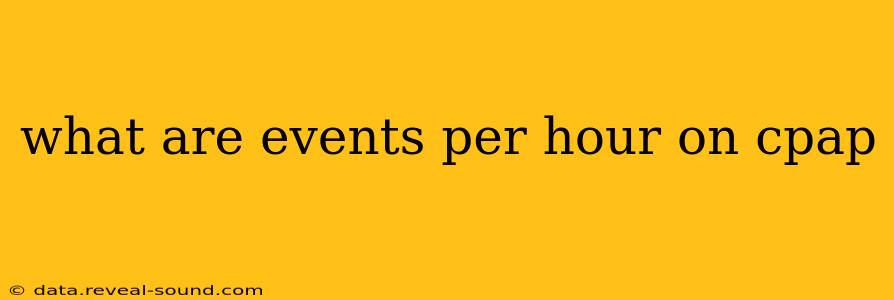Events per hour (EPH) on CPAP therapy refers to the number of disruptions in your breathing or airflow that occur during a one-hour sleep period. These disruptions can significantly impact sleep quality and overall health. Understanding what constitutes an event, the different types of EPH, and what your numbers mean is crucial for successful CPAP therapy.
What are the different types of events per hour (EPH)?
Several types of breathing disturbances are measured as events per hour during CPAP therapy. The most common include:
-
Apnea Hypopnea Index (AHI): This is the most commonly reported measure and represents the total number of apneas (complete pauses in breathing) and hypopneas (partial reductions in breathing) per hour. A higher AHI indicates more severe sleep apnea.
-
Apnea Index (AI): This measures only the number of apneas per hour.
-
Hypopnea Index (HI): This measures only the number of hypopneas per hour.
-
Respiratory Disturbance Index (RDI): This is a broader measure encompassing apneas, hypopneas, and other respiratory events such as respiratory effort-related arousals (RERAs). RERAs are instances where the body attempts to breathe but there's insufficient airflow.
It's important to note that the specific terminology and measurements used can vary slightly depending on the type of CPAP machine and the software used to analyze the data.
What do my events per hour numbers mean?
Your EPH numbers are crucial in determining the effectiveness of your CPAP therapy and the severity of your sleep apnea. Your doctor will use these numbers, along with other factors, to assess your treatment plan. Generally:
- AHI/RDI below 5: This is usually considered normal and indicates minimal to no sleep apnea.
- AHI/RDI between 5 and 15: This often indicates mild sleep apnea.
- AHI/RDI between 15 and 30: This usually indicates moderate sleep apnea.
- AHI/RDI above 30: This often indicates severe sleep apnea.
What if my events per hour are high?
If your EPH numbers are high despite using CPAP therapy, it's essential to discuss this with your doctor or sleep specialist. Several factors could contribute to high EPH numbers, including:
- Incorrect CPAP pressure: Your prescribed pressure might need adjustment.
- Mask leaks: A poorly fitting mask can lead to inaccurate readings and ineffective therapy.
- Underlying medical conditions: Other health issues might be affecting your sleep.
- Medication side effects: Certain medications can impact breathing.
- Obesity: Weight loss can significantly improve CPAP efficacy.
- Poor sleep hygiene: Adopting better sleep habits may help.
How are events per hour measured?
Events per hour are typically measured using a device called a polysomnograph (PSG) during a sleep study. This device monitors various physiological parameters, including breathing, heart rate, and brainwave activity, throughout the night. CPAP machines themselves often incorporate sensors that can monitor these events, though the data generated may be less detailed than a PSG.
What is the difference between events per hour and respiratory events per hour?
While the terms are often used interchangeably, "respiratory events per hour" is a more comprehensive term that includes all respiratory disturbances during sleep, such as apneas, hypopneas, and RERAs. Events per hour often focuses primarily on apneas and hypopneas, although the exact definition can vary depending on the context and the device used for monitoring. It's best to consult your sleep study report for a precise definition of the metrics used.
How can I improve my events per hour numbers?
Improving your EPH numbers involves a multifaceted approach:
- Ensure proper mask fit: A well-fitting mask is essential for effective CPAP therapy.
- Work with your doctor to adjust your CPAP pressure: Finding the optimal pressure is crucial.
- Address any underlying medical conditions: Treat any other health problems that might be contributing to sleep apnea.
- Maintain a healthy weight: Weight loss can significantly reduce sleep apnea severity.
- Practice good sleep hygiene: Follow a consistent sleep schedule and create a relaxing bedtime routine.
Remember: Your EPH numbers are a valuable tool for managing your sleep apnea. Regular monitoring and collaboration with your healthcare provider are key to ensuring the most effective treatment. Always consult with your doctor before making any changes to your CPAP therapy or treatment plan.
